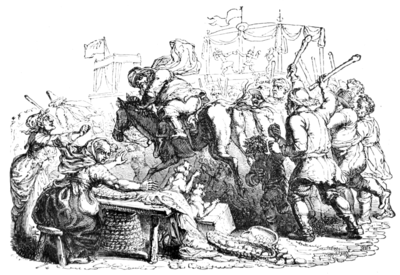of his reading. Most writers have more words than ideas, and the reader wastes much pains with them, and gets little information or amusement. Butler, on the contrary, has more ideas than words; his wit and learning crowd so fast upon him, that he cannot find room or time to arrange them: hence his periods become sometimes embarrassed and obscure, and his dialogues too long. Our poet has been charged with obscenity, evil-speaking, and profaneness; but satirists will take liberties. Juvenal, and that elegant poet Horace, must plead his cause, so far as the accusation is well founded.
In the preceding memoir, Dr Nash, the latest and most authentic of Butler's biographers, has been our principal guide; the reader who is desirous of a more critical and elaborate, though sometimes unjustly severe, view of the poem and the poet, will turn without disappointment to the eloquent pages of Dr Johnson.


